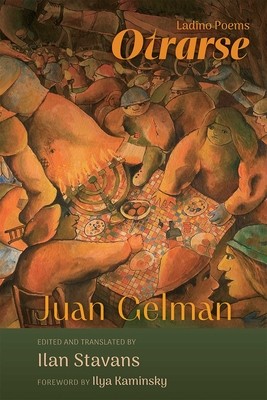
- We will send in 10–14 business days.
- Author: Juan Gelman
- Publisher: University of New Mexico Press
- ISBN-10: 0826366791
- ISBN-13: 9780826366795
- Format: 15.2 x 22.9 x 1.5 cm, minkšti viršeliai
- Language: English
- SAVE -10% with code: EXTRA
Reviews
Description
One of Latin American's most important poets of the twentieth century, Juan Gelman (1930-2014) spent much of his life in exile from his native Argentina during the Dirty War. A significant, seldom-acknowledged portion of Gelman's poetry dealt with Jewish themes. He established a dialogue across time with Santa Teresa de ÃÂvila and San Juan de la Cruz, the sixteenth-century Spanish mystical poets whose ancestry was Jewish. He rewrote poetic portions of the Bible as well as medieval Hebrew poetry. Gelman even taught himself Ladino, the language of Sephardic Jews, and wrote a volume of poems in it.
In this bilingual volume, celebrated scholar Ilan Stavans retraces Gelman's admiration for these poetic ancestors, translating into English his Jewish oeuvre by carefully maintaining the Hebrew, Spanish, and Ladino echoes of the originals. The result is at once historically accurate and artistically exhilarating, repositioning Gelman as a major Jewish writer of the last century.
EXTRA 10 % discount with code: EXTRA
The promotion ends in 23d.01:13:57
The discount code is valid when purchasing from 10 €. Discounts do not stack.
- Author: Juan Gelman
- Publisher: University of New Mexico Press
- ISBN-10: 0826366791
- ISBN-13: 9780826366795
- Format: 15.2 x 22.9 x 1.5 cm, minkšti viršeliai
- Language: English English
One of Latin American's most important poets of the twentieth century, Juan Gelman (1930-2014) spent much of his life in exile from his native Argentina during the Dirty War. A significant, seldom-acknowledged portion of Gelman's poetry dealt with Jewish themes. He established a dialogue across time with Santa Teresa de ÃÂvila and San Juan de la Cruz, the sixteenth-century Spanish mystical poets whose ancestry was Jewish. He rewrote poetic portions of the Bible as well as medieval Hebrew poetry. Gelman even taught himself Ladino, the language of Sephardic Jews, and wrote a volume of poems in it.
In this bilingual volume, celebrated scholar Ilan Stavans retraces Gelman's admiration for these poetic ancestors, translating into English his Jewish oeuvre by carefully maintaining the Hebrew, Spanish, and Ladino echoes of the originals. The result is at once historically accurate and artistically exhilarating, repositioning Gelman as a major Jewish writer of the last century.


Reviews